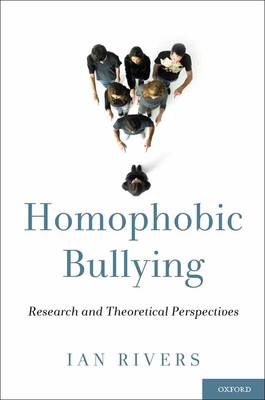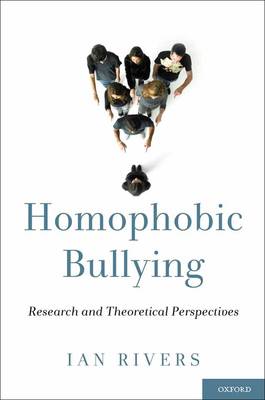
- Retrait gratuit dans votre magasin Club
- 7.000.000 titres dans notre catalogue
- Payer en toute sécurité
- Toujours un magasin près de chez vous
- Retrait gratuit dans votre magasin Club
- 7.000.0000 titres dans notre catalogue
- Payer en toute sécurité
- Toujours un magasin près de chez vous
107,95 €
+ 215 points
Description
Homophobic Bullying: Research and Theoretical Perspectives provides a review of key studies that have shaped the way we view homophobia in educational contexts. Using theories and ideas drawn from psychology, sociology, anthropology, and ethology, this book aims to conceptualize homophobic bullying as a construct of dominant institutions and groups that reinforce beliefs about the abnormality of homosexuality. Rivers demonstrates how bullying is a complex social process in which perpetrators are supported by active confederates, passive bystanders, and indifferent onlookers. Rivers also discusses new forms of bullying, such as cyberbullying, and explores the theoretical and social-psychological implications of bullying using new technologies. He discusses the challenges faced by teachers in eroding negative, implicit attitudes in the face of socially acceptable, explicit expressions of these attitudes.
Included here are primary data drawn from various studies that Rivers has conducted over the past two decades, along with discussions of key studies conducted by other researchers in the US, Canada, UK, Australia, and Scandinavia. Rivers explores the psycho-social correlates and potential long-term effects of bullying and homophobia, using various clinical studies as a guide to understanding the potential harm that results from school-based aggression. An important feature of this book is the integration of primary quantitative and qualitative data, case studies from parents, suggested lesson plans, and reports of recent legal action that highlight the dangers for students and teachers of not combating this particular form of school violence. Finally, the book looks to the future and the changing face of schools, the gradual erosion of homophobia as an accepted 'norm' within society, and the institutions that train future generations. Ultimately, this book reflects the research journey of its author and the development of a substantive world-wide body of evidence charting the challenges faced by those who are or are simply labeled lesbian, gay, or bisexual.
Included here are primary data drawn from various studies that Rivers has conducted over the past two decades, along with discussions of key studies conducted by other researchers in the US, Canada, UK, Australia, and Scandinavia. Rivers explores the psycho-social correlates and potential long-term effects of bullying and homophobia, using various clinical studies as a guide to understanding the potential harm that results from school-based aggression. An important feature of this book is the integration of primary quantitative and qualitative data, case studies from parents, suggested lesson plans, and reports of recent legal action that highlight the dangers for students and teachers of not combating this particular form of school violence. Finally, the book looks to the future and the changing face of schools, the gradual erosion of homophobia as an accepted 'norm' within society, and the institutions that train future generations. Ultimately, this book reflects the research journey of its author and the development of a substantive world-wide body of evidence charting the challenges faced by those who are or are simply labeled lesbian, gay, or bisexual.
Spécifications
Parties prenantes
- Auteur(s) :
- Editeur:
Contenu
- Nombre de pages :
- 248
- Langue:
- Anglais
Caractéristiques
- EAN:
- 9780195160536
- Date de parution :
- 11-02-11
- Format:
- Livre relié
- Format numérique:
- Ongenaaid / garenloos gebonden
- Dimensions :
- 163 mm x 236 mm
- Poids :
- 544 g

Les avis
Nous publions uniquement les avis qui respectent les conditions requises. Consultez nos conditions pour les avis.






